@sexycouture.la Cowgirl NEVER backs down from a challenge, she faces it head-on with grace and grit. #fyp #gritandgrace #westernfashion #western #cowgirl #jeans #jeanschallenge ♬ Wilderness, western, whistling, melancholy, western(833142) – みんと
@sexycouture.la Cowgirl NEVER backs down from a challenge, she faces it head-on with grace and grit. #fyp #gritandgrace #westernfashion #western #cowgirl #jeans #jeanschallenge ♬ Wilderness, western, whistling, melancholy, western(833142) – みんと
…stops at Matt Friend, 25. I’m a serious fan of the guy. Excellent Trump voice. “I’m an ass man!” Okay, I don’t like the too-short pants (nobody wants to look at calf skin) and the shoes, which don’t look Italian enough. But these are minor matters.
Ever since Broadway’s Hamilton popped in ’15 movies and stage shows been force-feeding progressive instruction to audiences…a hammering education about how things should or could have been in the past, if whites hadn’t been such racist assholes.
In the HE realm I’ve been calling it woke presentism for…what, three or four years?
In a 3.31.24 N.Y Times Sunday Magazine piece, written by By Kabir Chibber, it’s called “the Magical Historical Past.”
Yes, the N.Y. Times has finally summoned the courage to take notice of this widespread, years-long phenomenon. It actually calls it “Hollywood’s New Fantasy.” Hot off the presses.
Chibber quote: “You might call this kind of defiantly ahistorical setting the Magical Multiracial Past. The bones of the world are familiar. There is only one change: Every race exists, cheerfully and seemingly as equals, in the same place at the same time. History becomes an emoji, its flesh tone changing as needed.”
We all know the drill. Josie Rourke‘s Mary, Queen of Scots. Lynsey Miller and Eve Hedderwick Turner‘s Anne Boleyn. B’way’s Hamilton. Joel Coen‘s The Tragedy of Macbeth. Dev Patel as David Copperfield. Marvel’s Norse pantheon with a Black deity. A recently released version of Jane Austen‘s Sense and Sensibility is all Soul Sistahs. Bridgerton‘s Regency England ruled by a Black queen and a multiracial royal court. In BBC One’s Murder is Easy, originally written in 1939 and set (I think) in the 1950s, the lead protagonist and investigator is a Nigerian immigrant.
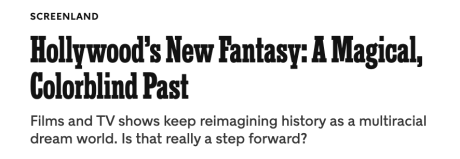
“Variety reported something on Friday that we simply cannot get out of our heads: the upcoming Joker sequel, Joker: Folie à Deux starring Joaquin Phoenix and Lady Gaga as Harley Quinn, will reportedly be a jukebox musical with at least 15 well-known songs [performed or lip-synched] in the movie.
“There are some things in life that are just too good to be true, and this sounds like one of them.” — USA Today‘s Cory Woodroof, 3.23.24.
Joker: Folie A Deux, an all but guaranteed Venice Film festival headliner (and hopefully Telluride also!) opens on 10.4.24.
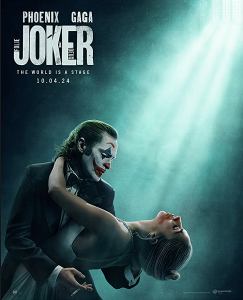
Last weekend in Manhattan a smallish stone was thrown at the great Michael Stuhlbarg (A Serious Man, Call Me By Your Name, Boardwalk Empire) but apparently it wasn’t that big of a deal.
The stone hit Stuhlbarg in the neck but he “declined medical attention” — a potentially serious wound that welcomely turned out to be a bit of nothingburger.
Stuhlbarg nonetheless chased the guy who threw the rock, 27 year-old Xavier Israel, and grabbed him or something. This led to Israel being arrested and charged with assault. The incident happened in Central Park near east 91st Street.
When I first read the story Stuhlberg was described as having been “attacked with a rock,” which makes it sound like some guy viciously beat Stuhlbarg with an apple-sized rock in his hand.
Stuhlbarg was assaulted, of course, but stones were thrown at me when I was a kid (thrown by “friends”) and it wasn’t the end of the world. Kids assault each other all the time, but if the same behavior happens in the adult realm cops, district attorneys and lawyers jump in and it becomes a whole big thing. Especially and justifiably if bodily harm results. Alas, this wasn’t the case with Stuhlbarg.
Compare the Stuhlbarg incident to the moment in Wes Anderson‘s Rushmore when Jason Schwartzman‘s “Max Fischer” shoots Stephen McCole’s “Magnus Buchan”, a beefy Scottish blowhard, in the ear with a pellet gun. McCole howls in pain but the attack is history ten seconds later as he and Fischer have moved on to other topics.
Think about it — The Rushmore “assault” is the same kind of aggression that happened to Stuhlbarg, but it didn’t warrant much attention on the Rushmore campus, much less significant headlines in People, Variety and The N.Y. Times.
The pellet gun moment happens at the 3:25 mark.
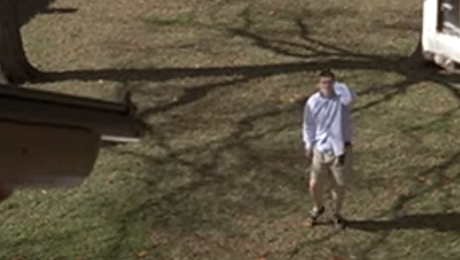
The three finest films in which the bad guy wins (i.e., totally outwits the good guys and demonstrates his absolute supreme dominance at the finale) are, of course, David Fincher‘s Se7en (’95), Gregory Hoblit‘s Primal Fear (’96) and Roman Polanski‘s Rosemary’s Baby (’68).
These three are top of the pops in this regard (okay, it’s not so much Satan but Team Satan that wins at the end of Polanski’s film), but perhaps I’m forgetting something?
Okay, Jonathan Demme‘s Silence of the Lambs counts to a large extent because of Hannibal Lecter‘s brilliant prison escape, but Lecter doesn’t “win” at the end — he’s just escapes to the Caribbean for a little rest and recreation.
The extremely clever Keyzer Soze gets away at the end of The Usual Suspects but he doesn’t “win” — he just eludes the grasp of the law.
Same with Anton Chigurh at the end of No Country for Old Men — he slips away with a fractured arm but hasn’t demonstrated that he’s better than Tommy Lee Jones‘ sheriff or that he’s the absolute king of wicked hill. He’s obviously fallible.
Alex De Large doesn’t “win” at the end of A Clockwork Orange — he’s simply restored to his original venal nature by the authorities.
Two months ago (2.5) I posted a few words about Barbara Rush, whom I had just seen for the first time in It Came From Outer Space (‘53) and then re-watched in When Worlds Collide (‘51). And now, as it must, death has placed a gentle hand upon her shoulder. She was 97. A rich, full life — and every time a movie fan watches Warren Beatty’s George Roundy try to get a bank loan in Shampoo, Rush will be re-remembered.
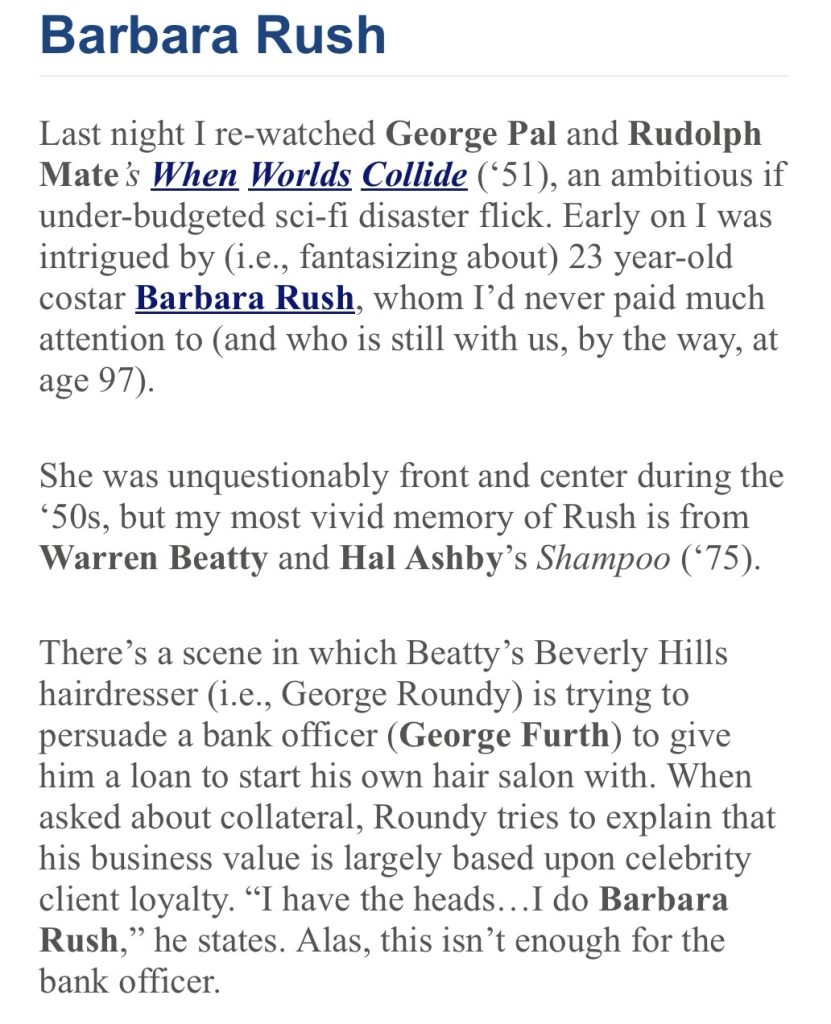
But I own a streaming 4K UHD Chinatown on Vudu and it looks quite beautiful. That’s right — because I don’t seem to know the difference between 4K streaming and a 4K disc, I am a total effing peon.


Despite the fact that Rod Lurie and Kyra Davis are first-rate people (seriously), they seem oblivious to the fact that frolicking in Las Vegas is tantamount to injecting poison into your soul.
HE would’ve loved to have partied in the Las Vegas of 65 years ago…Frank Sinatra-Dean Martin-Sammy Davis Jr. rat pack craps slots chickie baby booze broads bubbly “hold the Clyde” yong yong ring-a-ding-ding, etc. That’s all gone now.
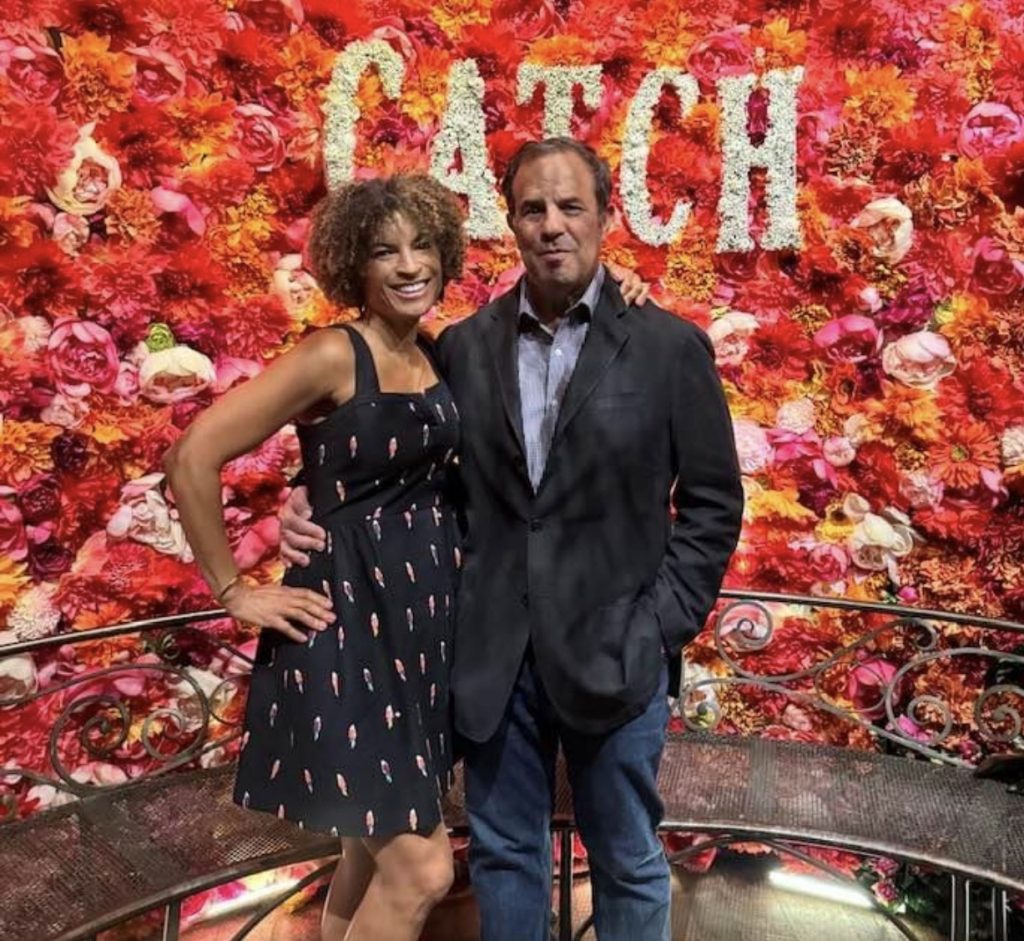
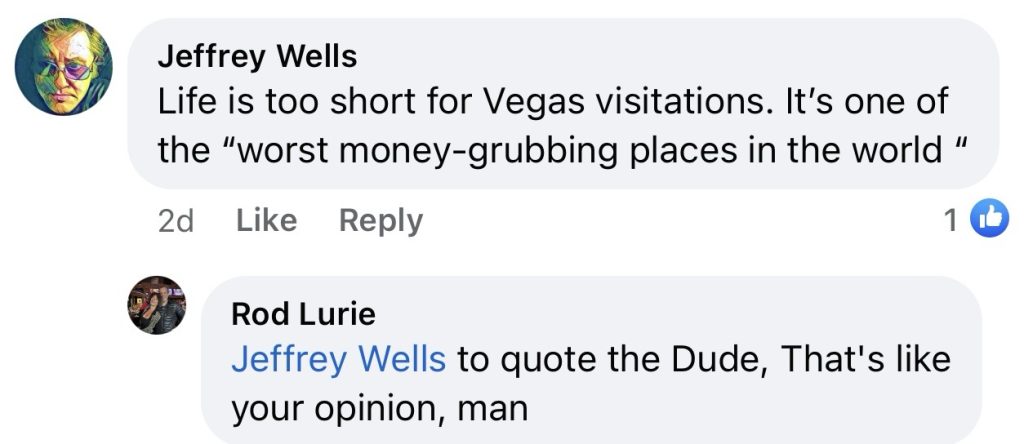
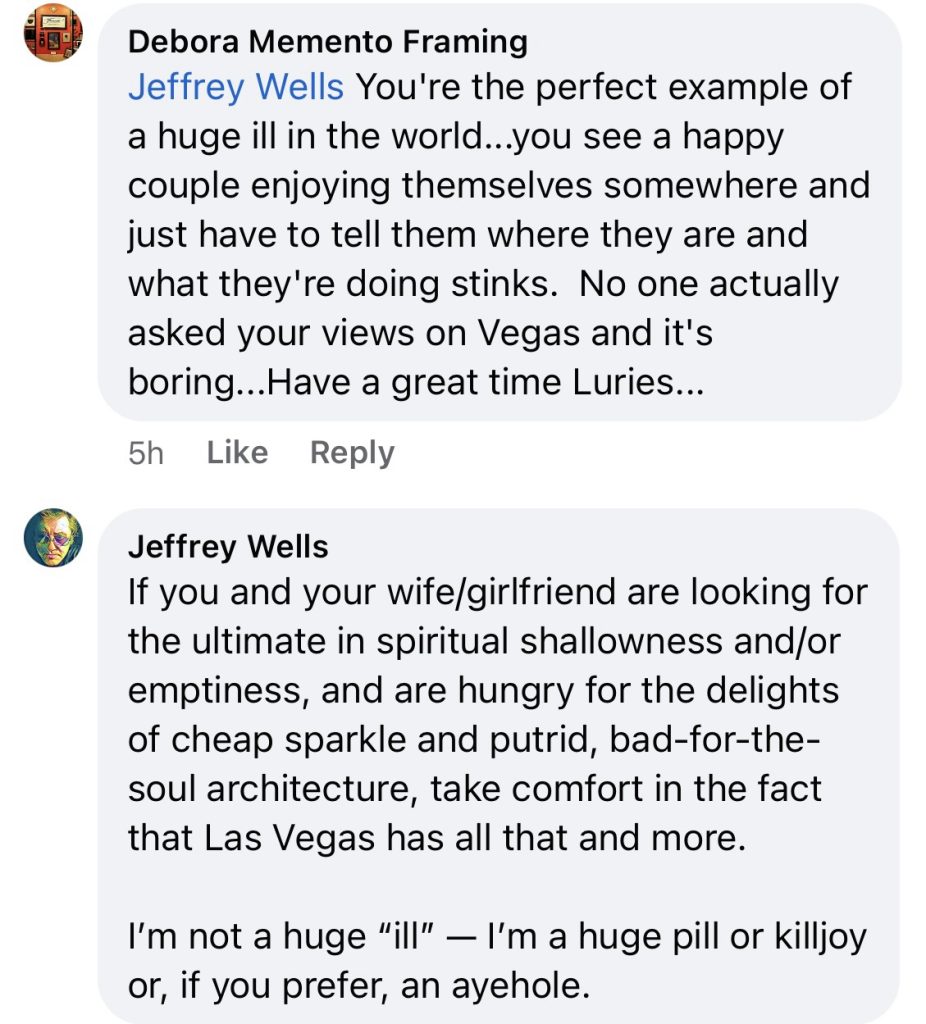
I’m sorry but I have a problem with Adam Driver‘s hairstyle in Megalopolis. His character, Ceasar, is a visionary architect, and his haircut strikes me as a cross between the 1964 bowl cuts favored by the Dave Clark Five and James Mason‘s Brutus in Joseph L. Mankiewicz‘s Julius Caesar (’53).
I think it’s fair to predict that Driver won’t be playing any more tortured, high-powered hotshots any time soon. Because Caesar makes it three in a row — Maurizio Gucci in House of Gucci (’21) and Enzo Ferrari in Ferrari (’23) being the first two.
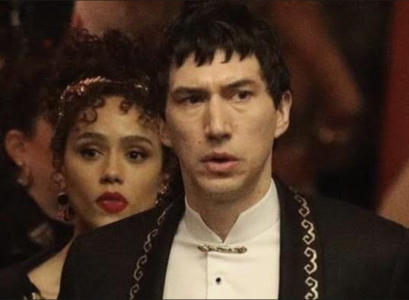
Forget anyone seeing Jerry Lewis‘s The Day The Clown Cried (’72) later this year, which some seem to believe is in the cards. Just forget it.
On 1.13.24 or two and a half months ago, the belief that The Day The Clown Cried would be screened in June 2024 at the Library of Congress archive in Culpeper, Virginia (or at least sometime this year) was seemingly put to bed by Indiewire‘s Christian Zilko.
Zilko (rhymes with Sgt. Bilko) reported that an LoC representative had “confirmed to IndieWire that no public screenings are planned, as the archive does not possess a complete cut of the film.”
Oh, yeah? Then why did L.A. Times reporter Noah Bierman, after visiting the Culpeper campus nine years ago, quote the LoC’s head archivist Rob Stone saying “the library [has] agreed to not show the film for at least 10 years”? If the full version can’t be shown for lack of material why talk about screening it at all?
Two months later I inquired about also visiting the Library of Congress campus, and particularly about the possibility of viewing the metal cans containing The Day The Clown Cried.
On 10.14.15 I received an emailed reply from Mike Mashon, head of the LoC’s Moving Image section.

He said that the LoC’s agreement with Jerry Lewis places an embargo on The Day The Clown Cried “for ten years, including screenings and making any element associated with it to the public and researchers.” In other words, no can photos until 2025, and perhaps not even then.
Again: If a screening of the completed film is out of the question due to insufficient material, why mention showing it in 2025?
Even if only sections of the film are shown someday, it seems clear that the embargo will be in place until 2025 and not 2024, as some are assuming.
Yes, I’m guilty of having previously posted about a presumed June 2024 unveiling date, but I was lazy or distracted or had bees in my head.
Just to be extra double sure, early this morning I asked Mashon to confirm the embargo date. He’s no longer on the job — retired. Let’s just presume that Clown Revelation Day, if it happens at all, won’t be until the summer of ’25.
“Clown Cried In A Cosmic Blink Of An Eyelash,” posted on 4.2.23:
Although the LoC apparently intends to eventually screen some kind of celluloid representation of The Day The Clown Cried at its Audio Visual Conservation campus in Culpeper, Virginia, curator Rob Stone has stated the LoC does not have a complete print of the film.
Posted on 6.15.16: I’m hardly an authority when it comes to Jerry Lewis‘s never-seen The Day The Clown Cried (’72), but…
I’ve read all the articles, I’ve read the script, I’ve seen that BBC documentary that popped last January, and I’d love to view it when the embargo is lifted ten years hence (i.e., in 2025). But I’ve never watched actual scenes.
This morning a friend passed along a 31-minute Vimeo file (posted two months ago but yanked on Thursday morning…sorry) that provides the first real taste of Clown, or at least the first I’ve ever sat through.